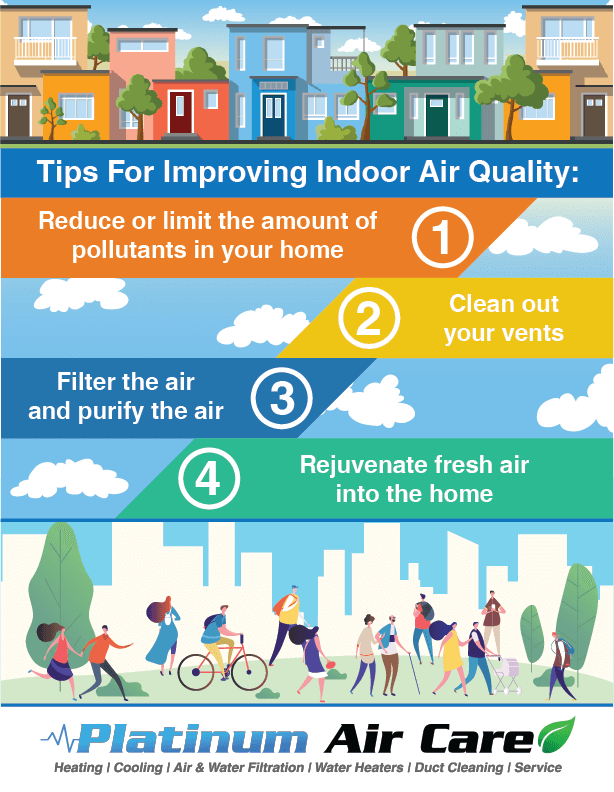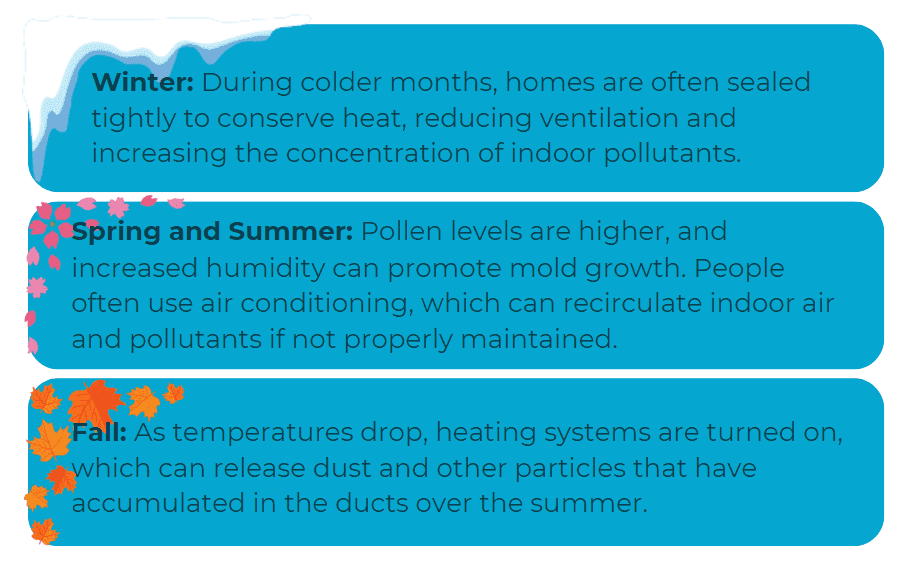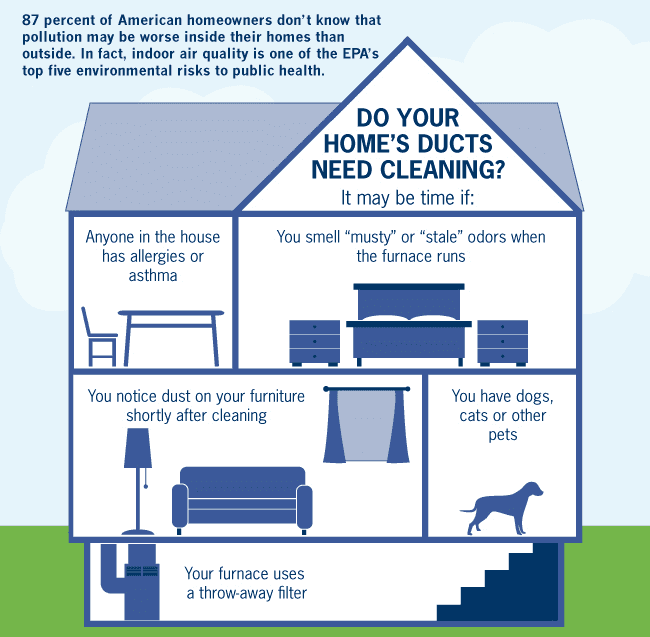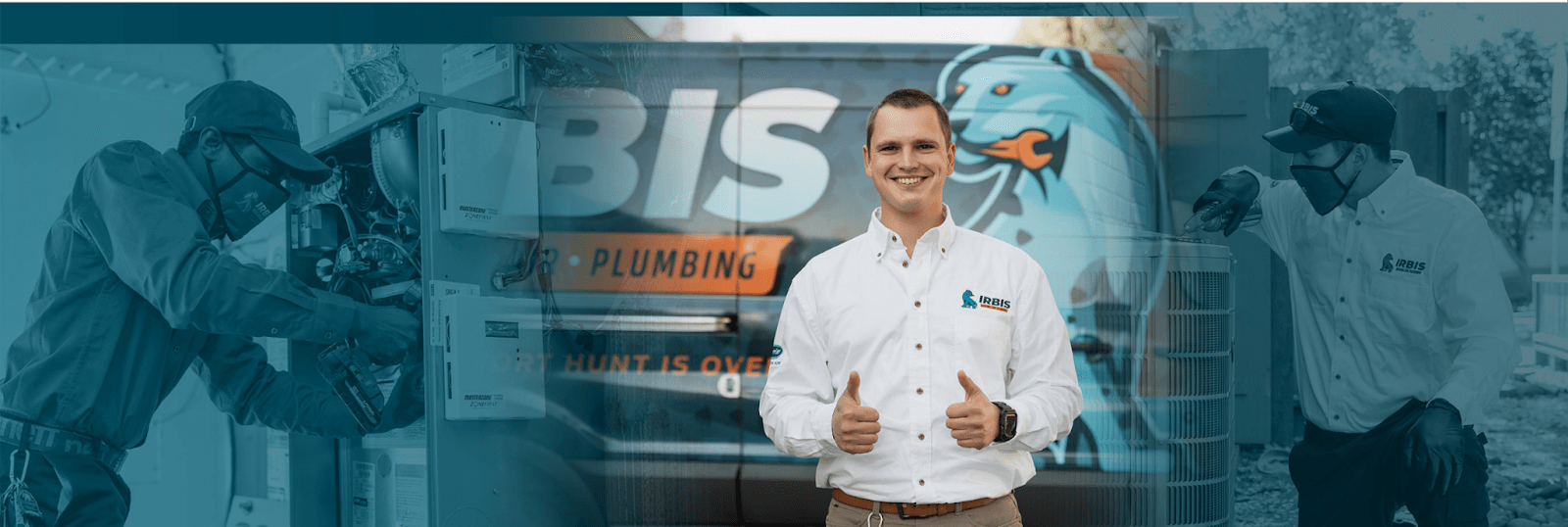
Imagine breathing air so pure that it not only enhances your comfort but also boosts your health and cognitive performance. At IRBIS HVAC, we are committed to making this a reality by revolutionizing indoor air quality (IAQ) in homes and workplaces across California. Drawing inspiration from cutting-edge research and the latest advancements in HVAC technology, we aim to create environments where clean air is the norm, not a luxury.
In this article, we will explore the essential components of IAQ, identify common indoor pollutants, and explain the impact of poor air quality on health. You’ll discover practical strategies to enhance IAQ, understand the pivotal role of HVAC systems, and learn how IRBIS HVAC’s advanced solutions can transform your indoor environment. Join us on a journey to healthier, fresher air and see how IRBIS HVAC can help you breathe easier every day.
Impact of Poor Ventilation on IAQ
Good IAQ correlates with adequate HVAC ventilation. Poor ventilation, on the other hand, leads to several issues:
- Accumulation of Pollutants: Without proper airflow, pollutants like VOCs, radon, and particulate matter can build up to unhealthy levels.
- Increased Humidity: Poor ventilation can cause higher humidity levels, leading to mold growth and dust mite infestations.
- Stale Air: Inadequate ventilation results in stale air, which can cause discomfort and exacerbate respiratory issues.
Seasonal Variations and Their Effects on IAQ
Indoor air quality can also vary with the seasons:

Health Effects
Poor indoor air quality can have a range of negative health effects, both short-term and long-term.
Short-Term and Long-Term Effects
| Short-Term Effects | Long-Term Effects |
| Allergies: Exposure to dust, pet dander, and pollen can trigger allergic reactions, leading to symptoms such as sneezing, itchy eyes, and runny nose. | Chronic Respiratory Diseases: Prolonged exposure to indoor air pollutants can contribute to the development of chronic conditions such as asthma, bronchitis, and even chronic obstructive pulmonary disease (COPD). |
| Respiratory Issues: Pollutants like smoke, VOCs, and mold spores can irritate the respiratory system, causing coughing, wheezing, and shortness of breath. | Cardiovascular Issues: Poor air quality has been linked to an increased risk of heart disease and hypertension. |
| Fatigue: Breathing in poor-quality air can lead to general feelings of fatigue and malaise, affecting your energy levels and overall well-being. | Cancer: Long-term exposure to certain pollutants, such as radon and VOCs, can increase the risk of developing cancer. |
| Neurological Effects: There is growing evidence that extended exposure to indoor air pollution can impact cognitive functions and may be linked to neurological disorders. |
Vulnerable Populations
Certain groups are more vulnerable to the effects of poor indoor air quality:

- Children: Young children have developing respiratory systems and are more susceptible to pollutants.
- Elderly: Older adults often have weakened immune systems and preexisting health conditions.
- People with Preexisting Conditions: Individuals with respiratory conditions (like asthma or COPD), cardiovascular diseases, or weakened immune systems are particularly at risk.
- Pregnant Women: Exposure to certain indoor pollutants can affect fetal development and increase the risk of complications during pregnancy.
Assessing IAQ
Signs of Poor IAQ in Homes and Workplaces

Identifying poor indoor air quality (IAQ) early can help prevent health problems and create a healthier living or working environment. Common signs include:
- Health Symptoms: Frequent headaches, dizziness, fatigue, or nausea.
- Allergic Reactions: Increased instances of allergies, such as itchy eyes, runny nose, or skin rashes.
- Unpleasant Odors: Persistent musty, chemical, or foul odors.
- Visible Mold: Mold growth on walls, ceilings, or around windows.
- Dust Accumulation: Excessive dust buildup on surfaces and around vents.
- Humidity Issues: High humidity levels causing condensation on windows and walls.
- Stale Air: Lack of fresh air circulation, making indoor air feel stale and stuffy.
Tools and Methods for Measuring IAQ
To accurately assess the indoor air quality in your home or workplace, you can use various tools and methods:
- Air Quality Monitors: Measure key indicators such as levels of particulate matter, carbon dioxide, VOCs, and humidity.
- Carbon Dioxide Monitors: High CO2 levels indicate poor ventilation.
- Humidity Meters (Hygrometers): Measure the humidity levels in your home.
- Radon Test Kits: Detect radon levels, a leading cause of lung cancer.
- Mold Test Kits: Identify the presence of mold spores.
- Professional Assessments: Comprehensive IAQ assessments by professionals.
- HVAC System Inspections: Regular inspections of your HVAC system.
Strategies to Improve IAQ
Improving Ventilation
- Opening Windows: Increase air circulation by allowing fresh outdoor air to replace stale indoor air.
- Using Exhaust Fans: Remove pollutants and excess humidity from areas prone to moisture and odors.
- Ensuring Proper Airflow: Make sure your HVAC system brings in a good amount of fresh air from outside.
Regular Maintenance of HVAC Systems
- Cleaning Filters: Regularly clean or replace HVAC filters to trap dust, pollen, and other airborne particles.
- Inspecting Ductwork: Periodically inspect and clean ductwork.
- Professional Maintenance: Schedule regular professional maintenance for your HVAC system.
Using Air Purifiers and Humidifiers
- Air Purifiers: Remove pollutants from the air, particularly models with HEPA filters.
- Humidifiers: Maintain optimal humidity levels (30-50%) to reduce mold and dust mites.
Choosing Low-VOC Products and Materials
- Low-VOC Paints and Finishes: Reduce the release of harmful chemicals into the air.
- Eco-Friendly Cleaning Products: Opt for products free from harsh chemicals and artificial fragrances.
- Building Materials: Select low-VOC materials for renovations or building.
Implementing Indoor Plants for Natural Air Filtration
- Air-Purifying Plants: Use plants like spider plants, peace lilies, and snake plants to improve IAQ.
- Placement: Distribute plants throughout your home for maximum air-cleaning benefits.
IAQ Solutions from IRBIS HVAC
How HVAC Systems Impact IAQ
HVAC systems play a crucial role in maintaining and enhancing indoor air quality (IAQ) by providing controlled ventilation, filtration, humidity control, and temperature control.
Importance of Regular Maintenance and Professional Services
- Improved Air Quality: Clean filters and ducts mean fewer pollutants are circulated.
- System Efficiency: A well-maintained HVAC system runs more efficiently.
- Longevity: Regular maintenance extends the lifespan of your HVAC system.
- Early Problem Detection: Professional maintenance services can identify and address potential issues early.
Advanced HVAC Solutions Offered by IRBIS HVAC

- Indoor Air Quality Monitoring: Identify pollutants and create targeted plans to address specific issues.
- UV Air Purification: Install UV lamps to target bacteria, viruses, dust mites, and mold spores.
- Advanced Air Filtration Systems: Install high-efficiency air filtration systems, including HEPA filters.
- Humidity Control Solutions: Dehumidifiers and humidifiers to maintain optimal humidity levels.
- Duct Cleaning and Repair: Regular duct cleaning and repair to improve air quality.
- Smart HVAC Technology: Integrate advanced HVAC systems with smart home technology for precise control of temperature, humidity, and air quality.
Conclusion
Maintaining good indoor air quality (IAQ) is crucial for your health, comfort, and overall well-being. Poor IAQ can lead to a range of health issues, from minor irritations and allergies to serious respiratory conditions and long-term health effects. By understanding the sources of indoor pollutants and implementing strategies to mitigate them, you can create a healthier living environment.
At IRBIS HVAC, we are committed to helping you achieve and maintain excellent indoor air quality. Our comprehensive range of services, including advanced air filtration systems, humidity control, UV air purification, and regular HVAC maintenance, are designed to address all aspects of IAQ. We use the latest technology and industry best practices to ensure that the air in your home is clean, fresh, and safe.
Improving IAQ starts with a thorough assessment of your home’s air quality. Our trained, certified technicians use state-of-the-art equipment to identify pollutants and recommend the best solutions tailored to your specific needs. From reducing common contaminants and improving comfort to increasing energy efficiency and reducing HVAC operating costs, our solutions offer significant benefits.
Don’t compromise on the air you breathe. Contact IRBIS HVAC today for a professional assessment and discover how we can help you enhance the indoor air quality of your home. Breathe easier, live healthier, and enjoy a more comfortable home environment with IRBIS HVAC’s expert services and solutions.
FAQs
What are the most effective methods to reduce indoor air pollutants in my home?
- Improving Ventilation: Open windows regularly and use exhaust fans to increase airflow and reduce indoor pollutant concentrations.
- Regular Cleaning: Dust and vacuum frequently using a vacuum cleaner with a HEPA filter to remove dust, pet dander, and other allergens.
- Air Purifiers: Invest in high-quality air purifiers with HEPA filters to capture airborne particles and pollutants.
- Control Humidity: Use dehumidifiers and humidifiers to maintain optimal humidity levels, preventing mold growth and reducing dust mites.
- Source Control: Use low-VOC products, avoid smoking indoors, and limit the use of scented products.
How often should I replace the filters in my HVAC system to maintain good indoor air quality?
HVAC filters should typically be replaced every 30 to 90 days, depending on the type of filter, usage, and environmental factors. Homes with pets or high dust levels may require more frequent replacements.
Can indoor plants help improve air quality in my home?
Yes. Certain indoor plants, such as spider plants, snake plants, and peace lilies, can help filter out common pollutants and improve air quality. However, they should not be relied upon as the sole method of air purification.
What are the benefits of using a whole-house air purifier compared to portable units?
- Coverage: Whole-house air purifiers provide comprehensive air cleaning for the entire home, ensuring uniform air quality.
- Convenience: They integrate with the HVAC system, requiring less maintenance and no need to move units from room to room.
- Efficiency: Whole-house systems often have higher filtration capabilities and can handle larger volumes of air compared to portable units.
How can I identify if my home has mold, and what steps should I take to remove it?
- Identification: Look for visible signs of mold growth on walls, ceilings, and around windows. Musty odors and health symptoms like allergies can also indicate mold presence.
- Removal: Clean small mold areas with appropriate cleaning solutions. For larger infestations, it’s best to hire a professional mold remediation service. Ensure the source of moisture is addressed to prevent future growth.
Are there any specific HVAC system upgrades that can significantly enhance indoor air quality?
- Air Filtration Systems: Upgrading to HEPA filters or advanced filtration systems can capture more pollutants.
- UV Air Purifiers: Installing UV lamps in the HVAC system can kill bacteria, viruses, and mold spores.
- Humidity Control Systems: Adding dehumidifiers or humidifiers to the HVAC system can help maintain optimal humidity levels.
- Duct Cleaning and Sealing: Regularly clean and seal ducts to prevent the buildup and spread of contaminants.
How do volatile organic compounds (VOCs) affect indoor air quality, and what are the best ways to minimize them?
- Effects: VOCs can cause respiratory issues, headaches, and long-term health problems like liver and kidney damage or cancer.
- Minimization: Use low-VOC or VOC-free products, improve ventilation, avoid the use of harsh chemicals, and opt for natural cleaning solutions.

